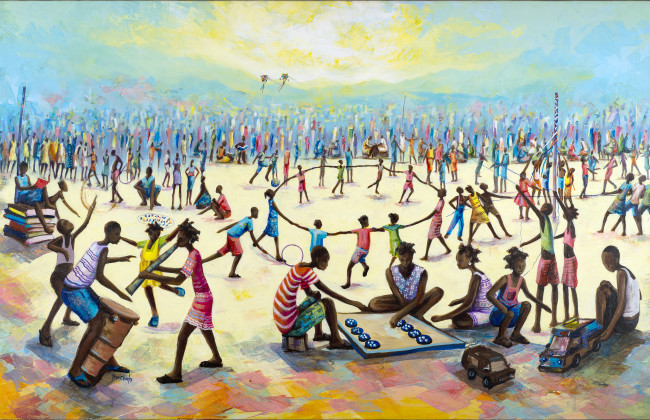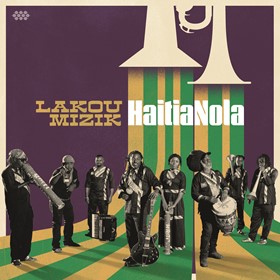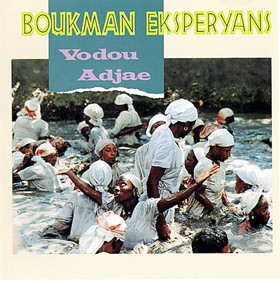Additional Resources
Happy Haitian Heritage Month!

The art above is an image from the Haitian Heritage Museum website: Haitian Heritage Museum
The month of May is Haitian Heritage Month!
Haitian and Haitian Americans especially represent a unique blend of several cultures. Haitian Islanders can claim ancestors from several African countries, France, Spain, Portugal, as well as from the native peoples of the Caribbean, the Taino. Their culture, their language (Haitian Creole), and their food display all of this influence. Haitians exist at the intersection of Latin American culture and that of the African Diaspora, alternately claimed by and excluded from both groups.
Haitian immigrants make up a small percentage of the large number of immigrants from around the world who chose to settle in Utica, NY.
Check out the links below for Haitian cuisine, the history of Haiti, and examinations of Haiti in the context of Latin America and the African Diaspora.
Ebooks Available from Our Catalog
After the dance, the drums are heavy : carnival, politics, and musical engagement in Haiti
Haitian carnival offers a lens into popular power and politics. Political demonstrations in Haiti often manifest as musical performances. Studying carnival and political protest side by side brings insight to the musical engagement that ordinary citizens and celebrity musicians often cultivate and revere in contemporary Haiti.
Haiti and the Americas
This book brings together an interdisciplinary group of essays to examine the influence of Haiti throughout the hemisphere, to contextualize the ways that Haiti has been represented over time, and to look at Haiti's own cultural expressions in order to think about alternative ways of imagining its culture and history.
Haiti and the Haitian Diaspora in the Wider Caribbean
The contributors to this volume explore the common thread of prejudice against the Haitian diaspora as well as its potential role in the construction of national narratives from a comparative and interdisciplinary perspective. These essays, written by historians, anthropologists, sociologists, and Francophone studies scholar.
Haiti Fights Back: the life and legacy of Charlemagne Péralte
"Haiti Fights Back: The Life and Legacy of Charlemagne Péralte is the first US scholarly examination of the politician and caco leader (guerrilla fighter) who fought against the US military occupation of Haiti. The occupation lasted close to two decades, from 1915-1934. Alexis argues for the importance of documenting resistance while exploring the occupation's mechanics and its imperialism
Racialized visions : Haiti and the Hispanic Caribbean
As a Francophone nation, Haiti is seldom studied in conjunction with its Spanish-speaking Caribbean neighbors. Racialized Visions challenges the notion that linguistic difference has kept the populations of these countries apart, instead highlighting ongoing exchanges between their writers, artists, and thinkers. Centering Haiti in this conversation also makes explicit the role that race-and, more specifically, anti-blackness-has played both in the region and in academic studies of it.
The Sexual Politics of Empire
Durban explores the creative ways that same-sex desiring and gender creative Haitians contend with anti-LGBTQI violence and ongoing foreign intervention. Compelling and thought-provoking, The Sexual Politics of Empire examines LGBTQI life in contemporary Haiti against the backdrop of American imperialism and intervention
The Unfinished Revolution
Unfinished Revolution is the first study to gather nineteenth-century representations and performances of Haitian sovereignty in the Atlantic world. In assembling this undiscovered archive of black power, this book offers compelling evidence of the ways that sovereignty and blackness intersect with unstable processes of modernity to produce an articulation of black authority always, already under threat for eradication or ridicule. Undeterred, nineteenth-century Haitian leaders mounted a century's-long battle to situate Haiti at the centre of the Atlantic world.
Where they need me: local clinicians and the workings of global health in Haiti
This book focuses on the work of Haitian health professionals in humanitarian aid encounters. Haitian doctors, nurses, pharmacists, and other health care workers act as intermediaries between actors from the global North (the United States, Canada and Europe) and Haiti's majority population, many of whom do not have access to decent care. This book address the reasons why international aid in Haiti suffers from a lack of coordination and some of the reasons why certain interventions succeed while others fail


